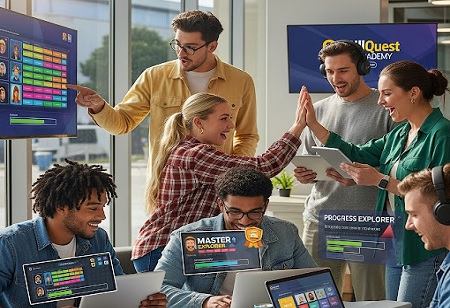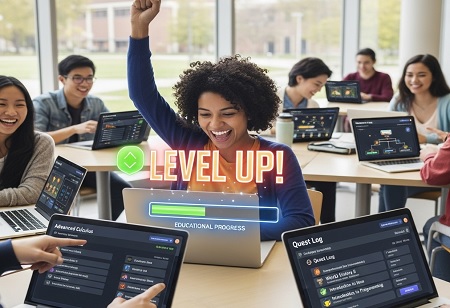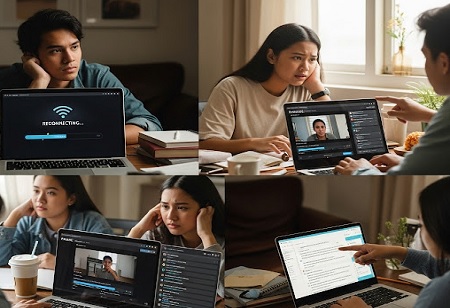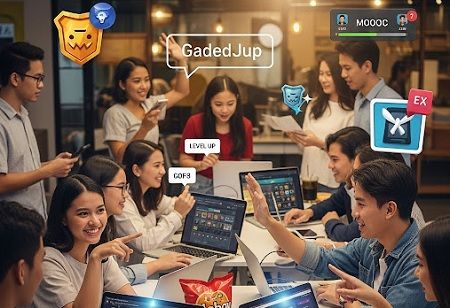-
- Filipino Gen Z learners are drawn to gamified learning platforms that offer instant feedback, achievement systems, and interactive storytelling mirroring their digital and gaming habits.
- The University of the Philippines Open University is pioneering gamified MOOCs by integrating elements like badges, leaderboards, and progress bars to create immersive, motivating learning experiences.
- While gamification boosts engagement and completion rates, issues like the digital divide, subject adaptability, and overemphasis on rewards need careful balancing to ensure meaningful learning.
In an era where attention spans are fleeting and digital engagement is the norm, the traditional classroom feels like a relic to Gen Z. Raised in a world of swipes, likes, and story modes, this generation craves interaction, instant feedback, and purpose-driven achievement. For Filipino Gen Z learners, education is no longer confined to chalkboards and textbooks it's evolving into something far more dynamic, immersive, and, surprisingly, game-like. Enter gamified MOOCs (Massive Open Online Courses) reimagined through the lens of play and their growing influence in the Philippines is nothing short of transformative.
NarendraShyamsukha, Founder & Chairman, ICA Edu Skills, emphasizes, "Learning can be greatly reinforced by practice. Gamification in education makes practice fun and leads to greater retention of knowledge. With MOOCs and LMS platforms powered by smartphones, learning is becoming increasingly personalized, flexible, and accessible especially for working professionals".
Gen Z's Learning Game

To understand the rise of gamified MOOCs, one must first understand Gen Z's learning behavior. This is a generation that has grown up in a hyper-connected digital world. YouTube tutorials, TikTok explainers, and interactive apps have replaced traditional note-taking. They don’t just want to learn they want to be immersed in the experience.
What truly captures their attention?
Systems that replicate the design of games, instant feedback, visual advancement, and feelings of accomplishment. Whether leveling up in a role-playing game or receiving badges on a language app, Gen Z is pre-programmed to react to spaces in which advancement is tangible, feedback is immediate, and incentives are regular.
Unfortunately, most conventional classroom spaces, with their closed-ended lecture-style setups and slow feed-back loops, fail. Thus, academic institutions are venturing into new territories, with gamified MOOCs at the forefront of challenging conventional wisdom about what learning ought to look and feel like.
"Storytelling is at the heart of everything we do, whether creating video-based eLearning for MOOC platforms, byte-sized ‘on-the-go’ learning apps, product education or specialized technology learning", says, Padmaja Narsipur, CEO, Clearly Blue Digital.
MOOCs in the Philippine Educational Landscape
The Philippines has been witnessing a silent revolution in its education system. With the increasing push towards digital learning, especially after the disruptions caused by the COVID-19 pandemic, MOOCs have gained massive traction. These open-access online platforms offer flexibility, accessibility, and affordability a perfect match for the digitally fluent Gen Z.
One of the pioneering institutions in this space is the University of the Philippines Open University (UPOU). While MOOCs have existed globally for years, UPOU has taken the bold step of localizing and tailoring them for the Filipino learner. But what truly sets UPOU apart is its experiment with gamification adding game-like elements to make learning not just accessible, but truly engaging.
Levelling Up Education

Since digital natives learn in their own way, UPOU embedded its MOOCs with game design elements that resonate with Gen Z sensibilities. Imagine digital badges to indicate milestones, progress bars providing graphic feedback, leaderboards that spark congenial rivalry, and points awarded for every quiz, activity, and participation.
This strategy goes beyond mere novelty. The structured use of these elements creates a learning experience that mirrors what students already enjoy in their favorite games and apps. Completing a module feels like unlocking a level. Scoring well in an assessment feels like topping a leaderboard. The dopamine hit from seeing a badge appear on the screen reinforces the behavior of continued learning.
More than just a clever trick, this model taps into the psychology of motivation transforming passive learners into active participants.
A Case Study in Impact
The impact of this gamified model is noticeable. Students enrolled in UPOU’s MOOCs began to describe their learning experience using words typically reserved for gaming ‘challenging’, ‘rewarding’, ‘addictive’. The perception of online learning shifted from being an isolated, monotonous task to an achievement-driven, goal-oriented adventure.
For instance, a 20-year-old UPOU student taking a course on digital marketing shared how earning badges kept her motivated to complete assignments even after a long day. “I felt like I was unlocking achievements in a game it pushed me to finish one more lesson, just to see that badge light up”, she said.
This isn’t just subjective course completion rates in gamified MOOCs are reportedly higher than their non-gamified counterparts. Engagement metrics are up, drop-off rates are down, and students are voluntarily spending more time in learning portals. It’s a shift from obligation to enthusiasm and it’s powerful.
Challenges That Still Need Solving

However, gamification isn’t a magic wand. While many Filipino Gen Z learners are embracing gamified MOOCs, challenges remain.
One issue is perception. Some students treat digital badges as digital stickers fun to collect but not necessarily indicative of real learning. There’s a risk of focusing more on the reward than the journey. Educational institutions must ensure that game elements supplement deep learning rather than overshadow it.
Then there’s the digital divide. The Philippines still faces significant inequalities in internet access and device quality. While urban learners may thrive in gamified MOOCs, students in rural areas struggle with connectivity issues that render such experiences frustrating or inaccessible.
Finally, not all subjects lend themselves equally to gamification. While soft skills and technical courses may be gamified with quizzes and simulations, subjects requiring nuanced discussion or ethical reflection (like philosophy or law) may resist oversimplification into point systems.
Miguel Mira da Silva, Instituto Superior Tecnico, highlights, "One of the main problems of Massive Open Online Courses (MOOCs) is the low retention rate of students and a high no-show rate. Meanwhile gamification has been gaining notoriety in the last decade within the education field".
Also Read: Understanding Educational Quality and Access in the Philippines
Despite these challenges, the potential is undeniable. Gamified MOOCs represent more than a trend they signal a cultural shift in how learning is conceptualized, delivered, and consumed by the new generation.
Consider a scenario where learners will like to invest their free time to go through a course since it is as engaging as a mobile game. In systems where education is customized, where advances are noticed, and where achievement is not only graded successful, but where it has foundational practice in activities that translate to the real world context.
In the Philippines, this future is already taking shape. Institutions such as UPOU are moving beyond the provision of courses and they are creating experiences. They are there, online, on-demand, and on-the-move, where Gen Z is.
Wrapping It Up!
By blending education with engagement, gamified MOOCs are shaping a learning culture that is dynamic, inclusive, and distinctly Gen Z. As the boundaries between learning and playing continue to blur, one thing is clear the game of education has changed, and Gen Z is ready to play.
🍪 Do you like Cookies?
We use cookies to ensure you get the best experience on our website. Read more...

